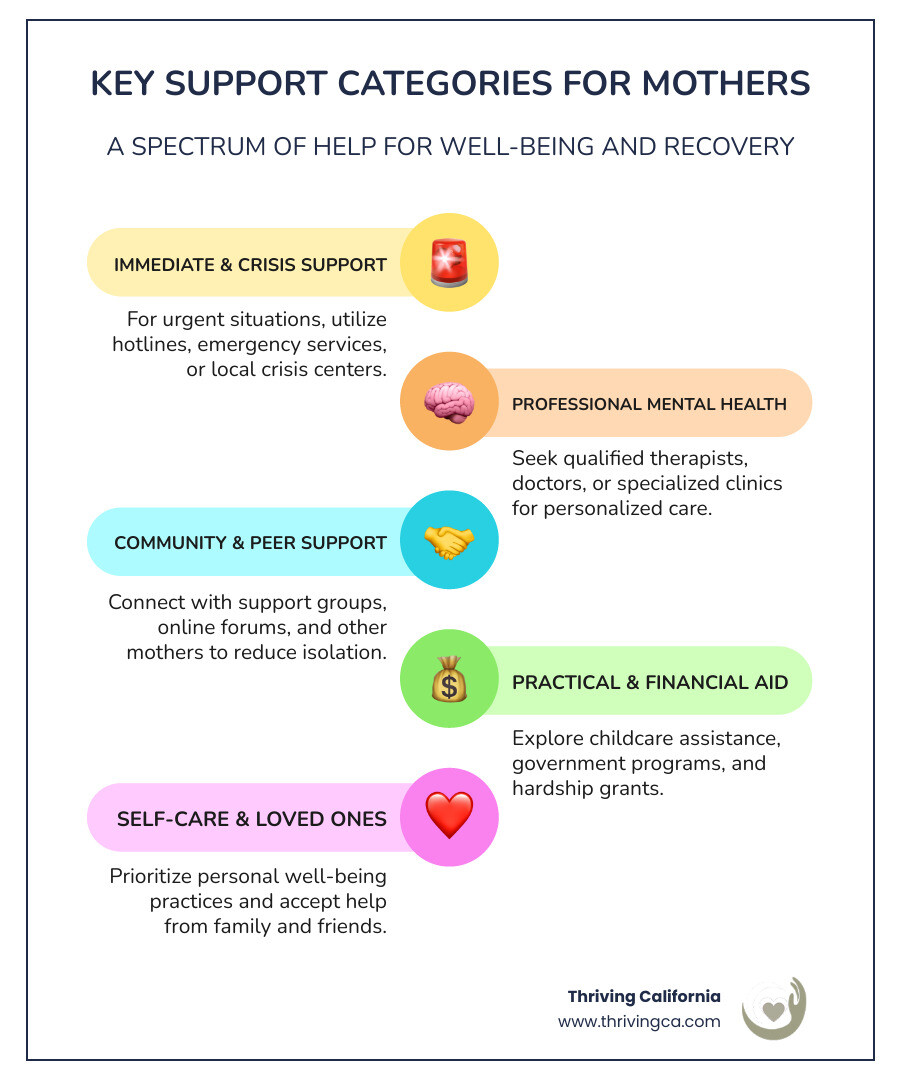Finding Your Footing: Support for Struggling Mothers

Motherhood brings profound transformation alongside unexpected challenges that can leave new moms feeling overwhelmed, anxious, or isolated. These difficulties often happen without warning, reminding us that unpredictability remains an inherent part of the parenting journey. If you're struggling right now, please know you're not alone—research shows that one in four mothers experiences mental health concerns. Seeking support for struggling mothers represents both courage and wisdom as you prioritize your well-being.
This comprehensive guide explores available resources and pathways toward healing and hope. Through professional mental health support, community connections, and intentional self-care practices, parents can develop resilience while managing the complex emotional experiences that accompany raising kids. Whether you're a new parent or have been on this journey for years, understanding available support makes all the difference.
At Thriving California, our group practice understands these challenges intimately. Dr. Maya Weir's personal journey through early parenthood inspired her dedication to supporting struggling mothers through evidence-based, compassionate care. Our doctoral-level clinicians blend professional expertise with genuine understanding, helping parents heal and strengthen family relationships throughout California.
Recognizing When You Need Mental Health Support
The reality of motherhood extends far beyond sleepless nights and taking care of a baby. Intense societal pressure toward "perfect parenting," combined with profound identity shifts, creates fertile ground for emotional distress. Experiencing overwhelming feelings, persistent anxiety, or sensing you're "not yourself" during pregnancy or postpartum represents common experiences rather than personal failures.
The perinatal period brings cascading hormonal, physical, and emotional changes that deserve compassionate attention and professional mental health support. Many mothers experience wide-ranging feelings from persistent sadness to deep depression—these aren't simply "part of the package" but genuine mental health concerns requiring thoughtful care. Acknowledging these struggles and being willing to talk about them marks your first courageous step toward healing.
Understanding Postpartum Depression in Mothers
Postpartum depression affects countless mothers after childbirth, presenting as a serious mental health condition distinct from temporary "baby blues." While baby blues involve mild mood swings that typically resolve within a week or two, postpartum depression symptoms persist with greater intensity. Experiencing several of the following symptoms for more than two weeks indicates the importance of seeking professional support:
Emotional symptoms mothers experience:
- Persistent sadness or depressed mood accompanied by frequent, unexplained crying
- Loss of interest in activities you once enjoyed, including hobbies or baby interactions
- Overwhelming feelings affecting your sense of worth as a parent
- Difficulty bonding with your baby, which can happen to even the most loving mothers
Physical and cognitive changes:
- Significant changes in appetite or sleep patterns unrelated to baby care
- Profound fatigue that rest doesn't relieve, making parenting feel impossible
- Concentration difficulties affecting daily life and childcare tasks
- Thoughts requiring immediate professional intervention (please reach out for mental health support immediately if experiencing these)
Remember that experiencing these symptoms doesn't reflect your worth as a mother—depression is a treatable medical condition. With appropriate therapeutic guidance and support, full recovery isn't just possible but expected. Many moms find that talking with professionals helps them recognize patterns and develop coping strategies.

Recognizing Anxiety in Parents
Postpartum anxiety occurs frequently among new parents, though it receives less public discussion than depression. Unlike normal parenting worries, this anxiety involves consuming fear that disrupts daily life and maternal joy. Research indicates that addressing anxiety early leads to better outcomes for both mothers and children.
Mental and emotional symptoms parents face:
- Excessive worry about baby health, safety, or parenting competence
- Racing thoughts preventing relaxation, making it difficult to talk calmly or think clearly
- Constant restlessness, feeling perpetually "on edge" around kids
- Deep-seated fear about being alone with your baby
Physical manifestations affecting health:
- Panic episodes featuring rapid heartbeat, breathing difficulty, or dizziness
- Chronic muscle tension and frequent headaches impacting daily life
- Digestive upset affecting your ability to eat and maintain physical health
- Sleep difficulties even when the baby sleeps through the night
These symptoms warrant professional mental health attention. Our clinicians provide effective therapeutic strategies helping parents regain calm and confidence in their parenting journey.
Processing Birth Trauma: Supporting Mothers Through Difficult Experiences
Some mothers experience traumatic births leading to lasting emotional difficulties. This can result from actual or subjectively experienced trauma during childbirth where mothers felt frightened or helpless. Understanding and processing these experiences is crucial for mental health recovery.
Birth trauma symptoms include:
- Intrusive memories about the birth experience that interfere with bonding
- Avoidance behaviors that affect your ability to talk about the birth or engage with your baby
- Hypervigilance making normal parenting tasks feel threatening
- Negative mood changes affecting family relationships and personal well-being
- Sleep disturbances beyond typical new parent exhaustion
At Thriving California, we specialize in helping struggling mothers process birth trauma through evidence-based approaches. Our doctoral-level clinicians utilize somatic resourcing and bilateral stimulation techniques, typically helping individuals find relief within 3-6 sessions.

Taking Your First Step: A Journey of Hope
When parenting challenges feel overwhelming, seeking help demonstrates remarkable strength. Making that initial call or scheduling a consultation acknowledges that your mental health matters and you don't have to navigate these difficulties alone. Many parents find that simply talking with someone who understands provides immediate relief and renewed hope.
Connecting with qualified professionals opens doors to nonjudgmental understanding and expert guidance. Taking this step prioritizes not just your health but your entire family's well-being. When mothers receive the support they need, children benefit from having a parent who feels more present, patient, and emotionally available.
Comprehensive Mental Health Resources for Parents
Recovery emerges through multifaceted approaches combining professional guidance, community support, and personal self-care. Understanding available resources helps parents build networks that sustain them through challenging times while celebrating parenting joys.
Professional Mental Health Care at Thriving California
Professional mental health care forms the foundation for struggling mothers seeking healing. Our group practice specializes in personalized therapy for parents navigating life with young children. We recognize that each parent brings unique experiences, and we tailor our approach accordingly.
Our Evidence-Based Approaches:
Psychodynamic Therapy helps parents understand how past experiences influence current parenting behaviors and emotional responses. This deeper understanding brings awareness and healing to generational patterns.
Relational Therapy focuses on building strong therapeutic relationships that model healthy connections. Through this secure relationship, parents develop tools for strengthening bonds with children and partners.
Internal Family Systems helps parents recognize different aspects of themselves with compassion rather than judgment. This approach proves particularly helpful for mothers struggling with conflicting feelings about parenting.
Gottman-Informed Couples Work supports parents facing relationship challenges. Though not Gottman-certified, our clinicians incorporate these principles helping couples communicate effectively while raising kids together.
Birth Trauma Processing utilizes somatic resourcing and bilateral stimulation, helping mothers process difficult birth experiences stored in the nervous system.
Our intake process respects the limited time and energy parents have available. Begin with a free 20-minute consultation to explore whether we're the right fit. We'll talk about your needs, answer questions, and discuss logistics. If another provider would better serve you, we'll provide appropriate referrals—your well-being is our priority.
Once care begins, expect weekly sessions where we create space for vulnerable exploration and growth. Individual therapy explores whatever feels most relevant to your current life—whether examining childhood experiences affecting your parenting or discussing current stressors. We follow your lead while occasionally suggesting resources that might support your journey.

Community Support: Finding Your People
While professional mental health support provides crucial foundation, connecting with other parents offers unique benefits. Community connections help mothers recognize they're not alone in their struggles. Hearing from others who've walked similar paths provides both practical wisdom and emotional validation.
Support opportunities throughout California include:
- Professionally-facilitated groups providing structured environments for sharing and learning
- Peer-led gatherings offering hope through shared experiences
- Online communities providing 24/7 access to understanding and encouragement
Organizations like Postpartum Support International help parents find local resources matching specific needs. These spaces welcome all parents—whether you actively participate or simply listen, you'll find acceptance and understanding.
Essential Self-Care for Parents
Taking care of yourself isn't selfish—it's absolutely essential for sustainable parenting. Self-care involves intentional steps nourishing your mental, emotional, and physical health. Even small efforts make a significant difference in managing stress and building resilience.
Practical Self-Care Strategies:
Mindfulness Practices: Brief breathing exercises or guided meditations help calm racing thoughts. Many parents find even three minutes of mindfulness improves their entire day.
Journaling: Writing helps process emotions and gain clarity. Try exploring what brings you hope or what you need to release each day.
Setting Boundaries: Learning to protect your energy represents critical self-respect. This might mean declining social obligations or asking family members to respect your parenting choices.
Movement: Gentle physical activity boosts mood and energy. A short walk with the baby or stretching during playtime counts as meaningful movement.
Rest Beyond Sleep: While sleep remains important, rest also includes quiet moments of restoration. Take advantage of any opportunity to recharge, however briefly.
Connection: Maintain relationships that feed your spirit. Even a quick text exchange with a supportive friend can brighten difficult days.
Planning Ahead: Schedule self-care activities ensuring they actually happen. When you plan ahead, you're more likely to follow through with taking care of yourself.
Remember that self-care benefits take time to manifest. Be patient as you develop sustainable practices supporting your well-being. Sometimes you need to wait to see results, but consistency pays off.

How Loved Ones Can Offer Meaningful Support
When mothers face mental health challenges, support from family and friends becomes invaluable. Partners, particularly husbands, can make tremendous difference by sharing responsibilities and maintaining emotional connection. Everyone can be responsible for creating supportive environments where struggling mothers feel heard and valued.
Practical Ways to Help Parents
Simple assistance often proves most helpful for overwhelmed parents:
- Prepare meals or coordinate food delivery to ensure proper nutrition
- Handle household tasks allowing mothers to rest or attend therapy
- Provide childcare enabling self-care activities or couple time
- Run errands reducing daily burden on struggling parents
- Simply be present, offering a listening ear without judgment
Always respect boundaries and preferences when offering help. Ask what would be most helpful rather than assuming, and follow through on commitments made.
Emotional Support and Encouragement
Beyond practical help, emotional support remains vital for mental health recovery. Focus on:
- Validating feelings without minimizing experiences
- Acknowledging the genuine difficulties of parenting
- Offering encouragement that recognizes both struggles and strengths
- Reminding mothers they're doing important work raising children
- Supporting decisions to seek professional help as signs of wisdom
Your consistent, patient presence provides hope during difficult times. Sometimes the most helpful thing is simply saying, "I hear you, and you're not alone in this journey."
Long-Term Benefits of Seeking Mental Health Support
Reaching out for help extends beyond surviving immediate difficulties—it profoundly impacts entire family well-being for years ahead. Parents who receive needed support model healthy coping strategies for their children while building stronger family foundations.
Benefits for Mothers
Receiving appropriate mental health care brings transformative changes:
- Improved emotional regulation benefiting all family relationships
- Increased confidence in parenting abilities and decision-making
- Enhanced awareness of personal needs and triggers
- Better communication skills strengthening partnerships
- Greater capacity for joy and presence in daily life
- Tools for managing future challenges with resilience
Research consistently shows that mothers who talk about their struggles and receive support experience better long-term outcomes.
Benefits for Children and Families
When mothers receive mental health support, entire families thrive:
- Children develop more secure attachments crucial for healthy development
- Family dynamics improve through decreased parental stress
- Kids learn emotional regulation through parental modeling
- Generational patterns of struggle can be interrupted and healed
- Siblings benefit from parents with greater emotional availability
- Partners experience stronger, more connected relationships
Supporting struggling mothers creates ripple effects benefiting multiple generations. Your decision to seek help represents profound love for your entire family.
Your Path Forward: There Is Hope
Motherhood's journey naturally includes times needing extra support. If you've felt overwhelmed, anxious, or simply not yourself, please know these experiences are valid and treatable. Seeking help demonstrates strength, wisdom, and deep love for your family.
Throughout this guide, we've explored pathways toward building comprehensive support networks. From recognizing mental health symptoms to finding professional therapy and leaning on community resources, multiple paths forward exist. Remember that healing doesn't happen overnight—be patient with yourself as you navigate this journey.
At Thriving California, our group practice remains dedicated to providing personalized, evidence-based therapy for parents throughout California. Whether you're in Lafayette managing new parent anxiety, processing birth trauma in Napa, navigating relationship challenges in Thousand Oaks, or connecting virtually from anywhere in California, we're here to support your unique needs.
Our doctoral-level clinicians understand the complexities of modern parenting. We believe in your resilience and capacity for growth. You deserve to feel supported, understood, and hopeful about your future as a parent.
When you're ready to take the next step, we invite you to reach out. Contact Thriving California today to schedule your free consultation. Together, we'll explore how our specialized approach can support your mental health journey, helping you build the thriving family life you envision. Your well-being matters, and support for struggling mothers is available when you're ready.
